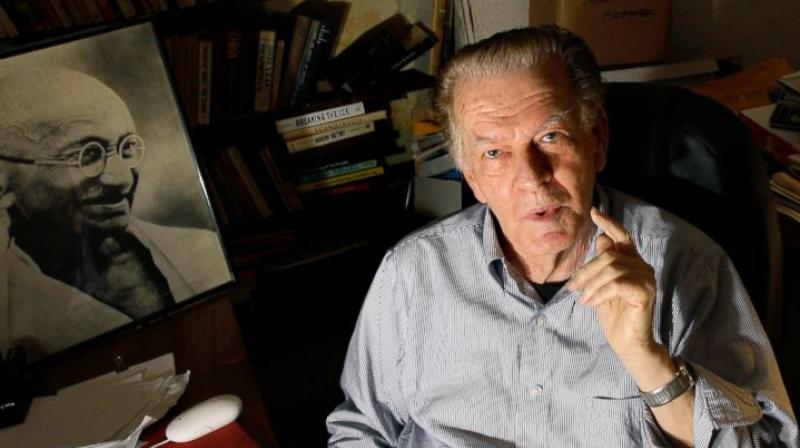Gene Sharp, Advocate for Nonviolent Resistance (21 Jan 1928 – 28 Jan 2018)
OBITUARIES, 5 Feb 2018
AP | Deccan Chronicle - TRANSCEND Media Service
Sharp died at his Boston home on Sunday [28 Jan], said Jamila Raqib, executive director of the Albert Einstein Institution, founded by Sharp in 1983.

Sharp founded the Albert Einstein Institution to advance the study and use of strategic nonviolent action as an alternative to violent conflict. (Photo: AP)
31 Jan 2018 – Gene Sharp, a lifelong advocate of nonviolent resistance whose influence has been cited in social upheaval around the world, has died.
Sharp died at his Boston home on Sunday, said Jamila Raqib, executive director of the Albert Einstein Institution, founded by Sharp in 1983. He was 90.
The cause of death was given as natural causes.
“Sharp devoted his life to studying nonviolent struggle, deeply researching and documenting its use in human history, analyzing how the technique operates cross-culturally, and sharing the results of his research with other scholars, practitioners, and organizers, government institutions, and citizens and civil-society groups on every continent,” the Boston-based institution said in a statement.
He continued to work until his death, Raqib said.
Sharp was inspired by his early studies of Gandhi, and his first book published in 1960 was Gandhi Wields the Weapon of Moral Power: Three Case Histories. He wrote dozens of books and articles on nonviolent resistance that have been translated into more than 50 languages.
The foreword to the book was written by Albert Einstein, another pacifist with whom Sharp corresponded for years.
Sharp founded the Albert Einstein Institution to advance the study and use of strategic nonviolent action as an alternative to violent conflict.
Sharp, once referred to as the “Machiavelli of nonviolence,” by the New Statesman, has influenced resistance to regimes around the world, from Eastern Europe, to Iran and Burma.
Iranian officials in 2009 said Sharp was among several Americans planning a “velvet revolution” in the country.
He denied playing any role in Iranian turmoil but added that he would be pleased if his work helped Iranians wage peaceful resistance.
“The more they learn that there is a nonviolent alternative to both violence and passive submission, the more chances they are to take a wise course of action rather than a stupid one,” Sharp said at the time.
Burmese authorities in 1996 accused four U.S. citizens, including Sharp, of working with insurgents and democracy activist Aung San Suu Kyi to overthrow the government.
Sharp also participated in nonviolent action and held workshops on nonviolent resistance around the world.
He spent nine months in jail after an arrest for protesting military conscription during the Korean War.
Sharp was born in North Baltimore, Ohio and has bachelor’s and master’s degrees from Ohio State University. He also has a doctorate from Oxford University.
In 1965, he became a research associate at the Center for International Affairs at Harvard University, a position he held for nearly 30 years. He also was professor of political science and sociology at the University of Massachusetts-Dartmouth.
Sharp never married and had no children. He is survived by nieces and nephews.
Go to Original – deccanchronicle.com
DISCLAIMER: The statements, views and opinions expressed in pieces republished here are solely those of the authors and do not necessarily represent those of TMS. In accordance with title 17 U.S.C. section 107, this material is distributed without profit to those who have expressed a prior interest in receiving the included information for research and educational purposes. TMS has no affiliation whatsoever with the originator of this article nor is TMS endorsed or sponsored by the originator. “GO TO ORIGINAL” links are provided as a convenience to our readers and allow for verification of authenticity. However, as originating pages are often updated by their originating host sites, the versions posted may not match the versions our readers view when clicking the “GO TO ORIGINAL” links. This site contains copyrighted material the use of which has not always been specifically authorized by the copyright owner. We are making such material available in our efforts to advance understanding of environmental, political, human rights, economic, democracy, scientific, and social justice issues, etc. We believe this constitutes a ‘fair use’ of any such copyrighted material as provided for in section 107 of the US Copyright Law. In accordance with Title 17 U.S.C. Section 107, the material on this site is distributed without profit to those who have expressed a prior interest in receiving the included information for research and educational purposes. For more information go to: http://www.law.cornell.edu/uscode/17/107.shtml. If you wish to use copyrighted material from this site for purposes of your own that go beyond ‘fair use’, you must obtain permission from the copyright owner.